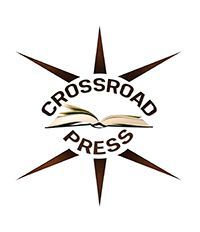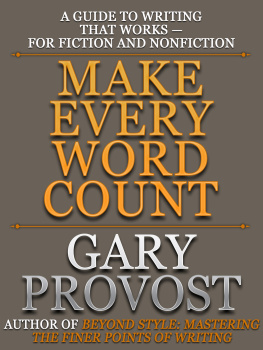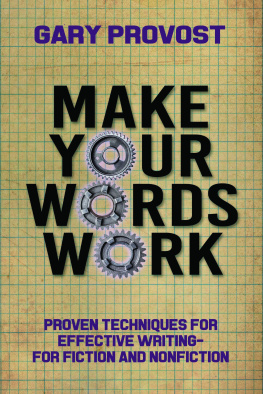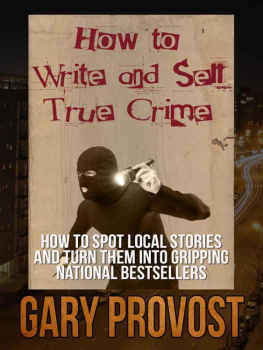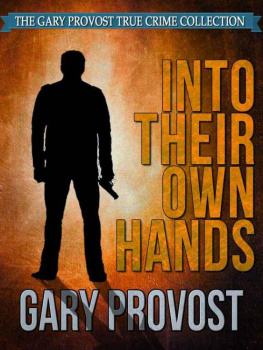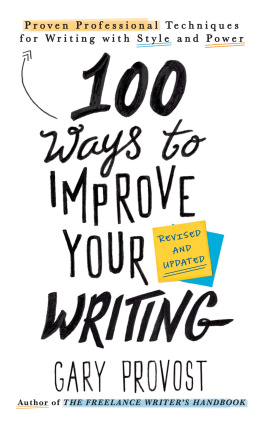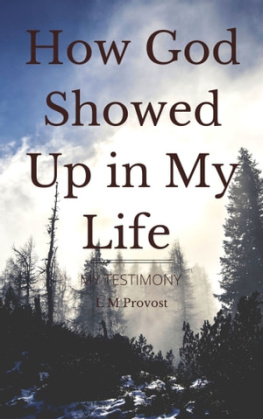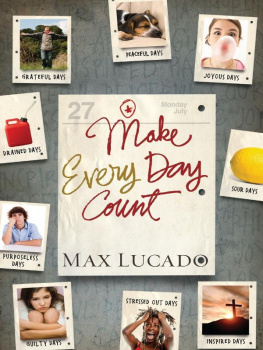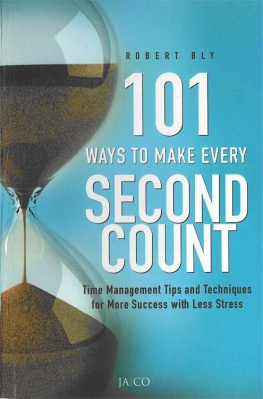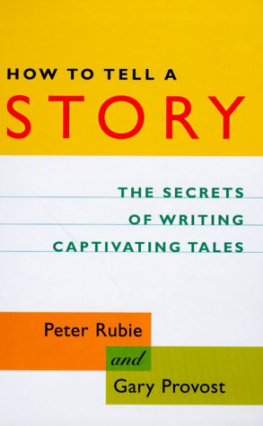MAKE EVERY WORD COUNT
A Guide to Writing That Worksfor Fiction and Nonfiction
By Gary Provost
A Crossroad Press Production
Digital Edition published by Crossroad Press
Digital Edition Copyright 2014 / The Estate of Gary Provost
LICENSE NOTES
This eBook is licensed for your personal enjoyment only. This eBook may not be re-sold or given away to other people. If you would like to share this book with another person, please purchase an additional copy for each person you share it with. If youre reading this book and did not purchase it, or it was not purchased for your use only, then you should return to the vendor of your choice and purchase your own copy. Thank you for respecting the hard work of this author.
Meet the Author
G ary Provost authored eighteen fiction and nonfiction books, including Fatal Dosage: The True Story of a Nurse on Trial for Murder ; Without Mercy: Obsession and Murder Under the Influence ; and Make Your Words Work . He wrote thousands of stories, articles and columns for national, regional and local publications; humorous columns for more than 100 newspapers; and celebrity profiles for a dozen magazines. He was a popular speaker around the country and also conducted several writing seminars and workshops a year.
Book List
The Dorchester Gas Tank
Make Every Word Count
The Pork Chop War
The Freelance Writers Handbook
Share the Dream (as Marion Chase)
Good If It Goes (with Gail Levine-Freidus)
One Hundred Ways to Improve Your Writing
Popcorn (with Gail Levine-Provost)
Fatal Dosage
Finder (with Marilyn Greene)
Beyond Style
David and Max (with Gail Provost Stockwell)
Across the Border
Without Mercy
Into Their Own Hands
Make Your Words Work
DISCOVER CROSSROAD PRESS
Visit us online
Check out our blog and
Subscribe to our Newsletter for the latest Crossroad Press News
Find and follow us on Facebook
Join our group at Goodreads
We hope you enjoy this eBook and will seek out other books published by Crossroad Press. We strive to make our eBooks as free of errors as possible, but on occasion some make it into the final product. If you spot any errors, please contact us at and notify us of what you found. Well make the necessary corrections and republish the book. Well also ensure you get the updated version of the eBook.
If youd like to be notified of new Crossroad Press titles when they are published, please send an email to and ask to be added to our mailing list.
If you have a moment, the author would appreciate you taking the time to leave a review for this book at your favorite online site that permits book reviews. These reviews help books to be more easily noticed.
Thank you for your assistance and your support of the authors published by Crossroad Press.
Excerpt from Las Vegas (What?) from The Kandy-Kolored Tangerine-Flake Streamline Baby by Tom Wolfe. Copyright 1964 by Tom Wolfe. Reprinted by permission of Farrar, Straus and Giroux, Inc.
Excerpt from Wild Times. Copyright 1978 by Brian Garfield. Reprinted by permission of Simon & Schuster, a division of Gulf + Western Corporation.
Because she walked with me every step of the way to all those empty mailboxes, this book is dedicated to my wife Nora (aka Pumpkin), whom I love more.
ACKNOWLEDGMENTS
Though a writer might hate to admit it, writing a publishable book is not something he does all by himself. He might write an almost publishable book, but by the time he is done his brain has become temporarily useless. Then he needs people to point out that his logic is sometimes circular, his metaphors are often mixed, his modifiers now and then dangle, and what he has written clearly and concisely he has written clearly and concisely six times.
Those people are called editors, and I have four of them to thank along the way. At Writers Digest Books they are Carol Cartaino, who knew exactly what I was talking about and encouraged me to write it down, and Howard I. Wells III and Anne Montague, who edited the final manuscript. But before they ever saw it, I had to write it, and that can be a lonely business. Fortunately, I had another editor, Donna Scalcione-Conti, who is a freelance writer and my most valued friend. Donna read the book as it came along, six or seven pages at a time, and she told me that it was good but still, this sentence could be improved and that paragraph could be cut. And best of all, she wrote good here and there in the margins, which, of course, is why I kept writing more pages.
To all of them, my thanks.
CONTENTS
.
INTRODUCTION
W e are writers, you and I.
We are writers because we write.
I have written over six hundred articles and stories that were published. I have written two books that were published.
But I have also written six books that were not published. And I have written hundreds of story beginnings, incomplete poems, bits of dialogue, and assorted great ideas that were never published.
It is what I have written that makes me a writer, not what I have published. If you write, you are a writer, whether you have published millions of words, a very few words, or no words at all.
I never had a word of mine published until I was twenty-nine, but I was a writer long before that. Writing has always been part of my life. Through practice and observation Ive come to learn what writing works and what doesnt, and Id like to share that with you.
When I was eight years old I put out a daily newspaper which I printed on yellow composition paper in the shed of our Boston home. The neighbors used to pay me a nickel a copy, so I guess the writing worked.
When I was fourteen I wrote long threatening letters to the credit manager of the Columbia Record Club. He was always sending me notices, suggesting I pay for the albums I had ordered. I was quite broke, so I always wrote back telling him not to walk through any dark alleys on the way home.
Youll hear the heavy, ominous footsteps of a madman, I once wrote, the chilling, insane laughter, the blood-curdling shriek, and the sickening thud of the mighty sledgehammer coming down on your head.
As you can see, I exercised considerable writers license in these letters, for it seems safe to say that should one be brained by a deranged teenager wielding a sledgehammer, one would not hear the thud. Anyhow, his letters stopped coming. The writing worked.
I kept a writers journal on and off during my teenage years, and even after I got out of high school and hit the road for a year of hitchhiking around the USA, I used to scrawl out story ideas on paper bags between rides.
After two years of rambling I stopped in New York City. I got an exciting job as a delivery boy for a watch importer, rented a microscopic apartment on the west side of Manhattan, and dished out fifty bucks for a secondhand typewriter. I was ready to become a writer.
Like most writers, I delved first into my own experience. I began a novel called The Rabbit Knows, which was about my hitchhiking experiences. I was like a lot of beginning writers. I thought the way to write a book was to load it up with a lot of words I had never seen in any other book.
